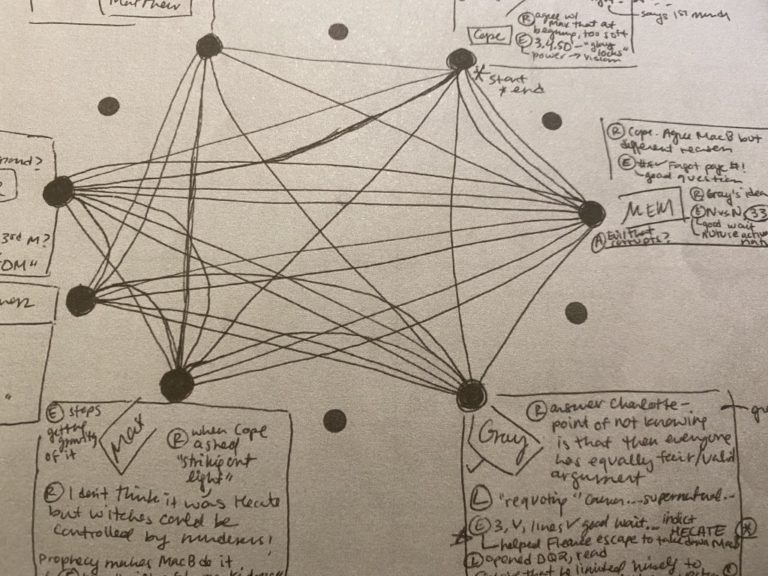3 Critical Listening Skills for Middle Schoolers
Listening skills are critical for students of all ages. They matter for academics, friendship, and all relationships – and yet, most schools stop proactively teaching students how to listen after age eight! Even then: children are most often taught how to “listen-to-comply” rather than the art of true, deep listening.
At R.E.A.L.®, we know that in today’s loud, distracted, self-centered world, listening needs to be explicitly taught and practiced in elementary, middle, and high school classrooms – and we have developed frameworks to do exactly that. What does it look like to teach listening? Let’s zoom in on middle school.
Here are three skills that are important – and challenging – for today’s middle schoolers to master.
1. Listening to Yourself
Listening to self is a critical first step in developing the skills that will enable students to expand their listening skills and become competent, respectful listeners in school and life. When students learn to listen to themselves, they practice key traits of self-awareness and self-regulation. They learn to notice what they are thinking, feeling, and doing – and use their analysis to make intentional choices about their behavior. The biggest challenges to listening to yourself for middle schoolers? Self-regulation and multi-tasking.
The technology with which today’s middle schoolers interact on a daily basis is designed to minimize self-regulation. Tech like social media and online games are subject to persuasive design, which intentionally attempts to seize attention and interrupt self-regulation. The ethics of that type of design for kid-facing products are hotly debated, but that debate has not, to date, prevented kids from utilizing tools and tech that make it hard for them to listen to their own internal dialogue and regulate their own behaviors.
Similarly the fast-paced, frenetic world created by technology has led to constant multi-tasking, and a sense of discomfort with quiet and solitude. This means that for some kids, listening to themselves is actually stressful and anxiety-producing. Finally, a screen-bound world has made it harder to parse body language and non-verbal cues that increase self-awareness. The result is a generation of students who may not be very comfortable or familiar with the acts of self-awareness and self-regulation.
2. Listening to Adults
In order for learning to happen, it’s essential for students to listen to the adults with whom they interact on a daily basis. That can look like listening to a teacher’s instructions during class, listening to a coach at practice after school, or listening to a parent at dinner. As any teacher, coach, or parent knows, however, actually getting teens to listen can be just as hard as it is important.
When we break down the skill of listening to adults for middle schoolers, we explain that this skill is about showing respect and gathering information. Attentive listening demonstrates respect for the adults in students’ lives who are taking time to instruct them, and it also enables students to gain information they need to be successful.
Listening to adults doesn’t mean being silent or acquiescing to an instructor’s mandates. We teach kids that listening to teachers, coaches, and other adults doesn’t mean they can’t ask questions or disagree – but it does mean they first need to listen to the adult’s perspective and truly understand what’s being asked. Often, these learning leaders have information the student doesn’t!
Listening to learning leaders is particularly challenging for Gen-Z students. Many teens in this demographic find in-person auditory comprehension difficult: indeed, 59% of Gen-Z-ers elect to use subtitles when they watch videos. It can be hard to absorb and retain content during a real-time, unsubtitled, in-person conversation.
What’s more, today’s students have shorter attention spans than those of the preceding generations. Capturing – and keeping – teens’ attention is thus a much taller order for today’s learning leaders.
Finally, a pervasive culture of individualism threatens this particular listening skill. There is a sense among Gen-Z students that doing as someone asks may undermine your authentic self – which, in turn, can limit students’ interest in or ability to listen well.
3. Listening to Peers
Listening is a hallmark of any relationship. It’s essential in understanding feedback from teachers, in understanding a friend’s perspective, and in demonstrating empathy to someone who needs help. In class, a dynamic and insightful discussion simply cannot happen if classmates cannot listen to each other effectively and respectfully.
The R.E.A.L.® program teaches middle school students that listening to their peers is about building strong relationships with friends and classmates. That doesn’t mean peers can’t disagree – it just means they listen to one another respectfully before offering their own perspective. We teach students that the ability to make someone else – whether a best friend or an acquaintance in your class discussion group – feel heard is a superpower.
In truth, though, listening to their peers is particularly difficult for Gen-Z students. Today’s kids spend more time online than they do communicating in person – and as a result, every face-to-face interaction feels higher stakes and, thus, more stressful.
Plus, the rise of misinformation, disinformation, and polarization has led to a generation-wide tendency to question rather than trust by default. Today’s culture has normalized not listening to opinions you disagree with, and it’s typified responding in a disrespectful way, with name-calling, dismissal, or cancellation.
It’s (Historically) Hard to Learn to Listen…But Listening Is Teachable
Poor listening skills have long been a hallmark of the stereotypical teenager. Today’s teens, though, are facing unprecedented challenges that threaten to erode these foundational skills. That’s concerning – not just for the parents and teachers who struggle to make breakthroughs with their Gen-Z charges, but for the friendships and inner lives of Gen-Zers themselves.
The good news is that listening is a skill that can – and must! – be taught. At R.E.A.L.®, we train teachers both to understand the various levels of listening their students must encounter on a daily basis and to instruct them in ways to become better listeners to themselves, to adults, and to their peers.
Ready to learn more about how to teach the important skill of listening? Reach out to our team today.






